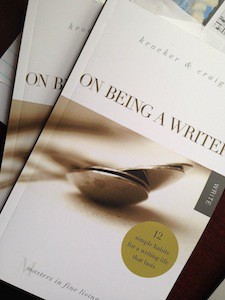It may not seem so, but in their early days of writing, all writers were builders.
Much as we might like to believe someone could slap down a suitcase of money to buy that beautiful mansion, it doesn’t work that way. No one moves into a house they didn’t build. Of course, everyone tries before realizing it, and “squatting” can work for a while. But soon you’ll know: it isn’t right. It isn’t yours. And the only thing to be done is to find some land, pick up the tools, and start building.
The phases are fairly predictable. Apprentices are always looking for shortcuts, anything to get that wall up fast so they can move on to decorating and throwing the housewarming party. But soon the nails don’t seem to be going in right and there’s something jammed in the nailgun, and a master builder points out how they nearly shot their finger off there.
That wasn’t supposed to happen. A hammer is not a nail gun. This isn’t a fun time. There may be sulking.
Here’s where most quit. It’s not that it’s too hard or they don’t want to learn; they simply get overwhelmed. They never wanted this. All they wanted was a house.
Yet if they’d just held on and pushed past that initial shock, they would have become craftspeople. They’d have come upon some blueprints and started to pick up some tricks. They’d have landed upon their favorite ideas and begun getting inspired studying others builders’ techniques. They’d have gotten past the breathlessness and accepted that rules dictate good houses and the one that suits them best determines what they need to use. They’d be at this for a while, but their dream of the gabled roof, the dormers they’d get to put on, the smell of new wood, and the feel of the hammer in their hands. It would become a part of life they looked forward to. Those familiar motions and the sound of clacking punctuating the silence.
The rooms would become manageable and shrink to fit around them like their own new skin. And one day, they’d know it though they might not even think about it, they’d be a homeowner.
If they would keep having fun working, it would happen. Somewhere between the 100th time making the same mistake and appreciating the slanting sun on the freshly-hung door, they’d forget all the rules about leveling and measuring and it would become automatic. The hammer would start swinging on its own.
So. Pick up your hammer? How does it feel? Do you sense its energy, how it wants a nail? Yes, writer, you will be homeowner. And by my trusty hammer, it’s going to be amazing.
Photo by Swiatekj, Creative Commons, via Flickr. Post by Mick Silva. Mick has served as an editor at Waterbrook/Random House.
_________________________
Is your writing life all it can be?
Let this book act as your personal coach, to explore the writing life you already have and the writing life you wish for, and close the gap between the two.
- Build Your Writing, Then Move In - March 16, 2013
- Memoir Workshop: Let It Make All the Difference - March 5, 2013
- Disturbed? Every Writer Should Be - March 5, 2013


L.L. Barkat says
I remember when it used to take me forever to write something. Weeks and weeks, just for 10 pages.
You are right. Time and practice change our abilities.
I can write a whole book now, in the same amount of time. And sometimes the book is not even half bad. 😉
SimplyDarlene says
Oh, I like this bit. A whole lot.
“They’d have come upon some blueprints and started to pick up some tricks. They’d have landed upon their favorite ideas and begun getting inspired studying others builders’ techniques. They’d have gotten past the breathlessness and accepted that rules dictate good houses and the one that suits them best determines what they need to use.”
Thank you.
Blessings.
Donna says
I like this too… so much. Thank you!
I keep thinking of my dad as a young man and how he figured building a house wasn’t rocket science, just hard work. So he ordered the plans from Family Circle Magazine back in the 1950s and he built a house. The paper wrote stories about it: The House that Vic Built. They still live in that house. I think of that a lot – how a job is only as hard as it is and no more, and only until it’s not any more. It is just like you said,they’d have “begun getting inspired studying others builders’ techniques”… they did just that. Seems all the FC Pioneers knew who the others were so they would knock on Doors, or beams if the doors weren’t up yet, and ask questions, compare notes, share stories. Writing and building a house are more alike than I ever realized. That’s what this piece reminded me of. Hmmm… this is a juicy concept.
And LL, I can’t picture you laboring over pages in that way. I’m glad you share that. 🙂
Mick says
A week a page, Laura, that’s my motto. 😉
Ira Glass has a series of short videos at Youtube on storytelling–well worth checking out. He says there are building blocks and you use them through developing your skill. This capricious, porous, maleable art we want to protect and keep sacred–it doesn’t need our reverence. It needs us to pick up a hammer and make the home livable.
Donna, I love how you filled in that picture with your dad. Writing can be so practical, pinning down what’s truly enjoyable about life–a hammer wants a nail!
It makes it easier, doesn’t it, writing like that? Simply pursuing a memory for the experience it brought? A swinging hammer is excellent entertainment when your heart is imagining a home…
Kathleen says
Mick, love finding you here, there, and everywhere. This was a shot of courage. [chug]
I’m going to find those shorts on YouTube. You and L.L. have both given me a sound base as I painstakingly apprentice with master builders. I appreciate you both for building a foundation for me and giving me tools as I learn.
movers quotes Manchester MA says
At this time I am going away to do my breakfast, after having
my breakfast coming over again to read other news.